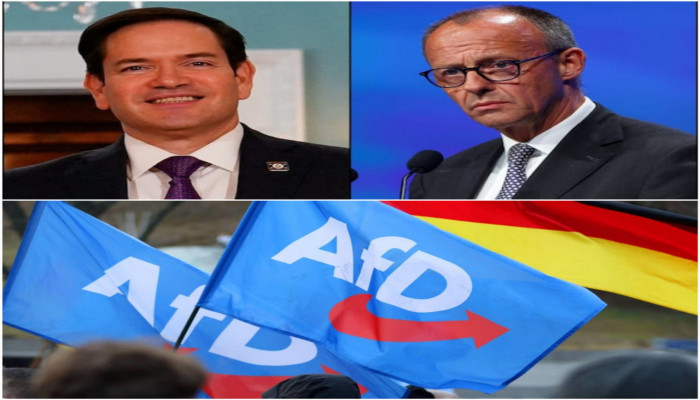Marco Rubio slams Germany’s move to designate AfD as 'extremist', calls it 'tyranny in disguise'
- In Reports
- 02:00 PM, May 03, 2025
- Myind Staff
A sharp clash has unfolded on X between U.S. Secretary of State Marco Rubio and Germany’s foreign ministry after Rubio criticised the German government, calling its action “tyranny in disguise” for labelling the far-right Alternative for Germany (AfD) party as extremist. In a Friday post, the senior U.S. diplomat criticised Germany after its domestic intelligence agency, the BfV, labelled the far-right AfD party as “extremist,” a move that permits closer monitoring of the group. AfD leaders have strongly opposed the decision.
“Germany just gave its spy agency new powers to surveil the opposition. That’s not democracy—it’s tyranny in disguise," stated Rubio on X. He added, “What is truly extremist is not the popular AfD – which took second in the recent election – but rather the establishment’s deadly open border immigration policies that the AfD opposes. Germany should reverse course."
Responding to Rubio’s comments, the German Foreign Ministry defended its actions, stating, “This is democracy. This decision is the result of a thorough & independent investigation to protect our Constitution & the rule of law." The ministry also emphasised that, “It is independent courts that will have the final say. We have learnt from our history that rightwing extremism needs to be stopped." Meanwhile, U.S. Vice President JD Vance supported Rubio’s stance. "The AfD is the most popular party in Germany, and by far the most representative of East Germany. Now the bureaucrats try to destroy it," he penned. He added, “The West tore down the Berlin Wall together. And it has been rebuilt—not by the Soviets or the Russians, but by the German establishment."
The AfD is known for its leaders' controversial remarks, including anti-Semitic, anti-Muslim, and anti-immigrant statements, along with demands to deport large numbers of immigrants. In the recent German federal elections, the party secured second place with 20.8% of the vote and won 152 out of 630 seats, gaining momentum in the weeks leading up to the vote due to ongoing economic and security challenges in the country. After labelling the AfD as an extremist group, the BfV stated that the party's portrayal of particular groups of people as second-class citizens goes against Germany’s democratic principles. In its statement, the agency said, “It aims to exclude certain population groups from equal participation in society, to subject them to treatment that violates the constitution, and thereby assign them a legally subordinate status."
The Alternative for Germany (AfD), a far-right political party, has received backing from the Trump administration in the U.S. AfD leader Alice Weidel met with U.S. Vice President JD Vance and Elon Musk in the election run-up. The party has been linked to the resurgence of Nazi ideology in Germany and parts of Europe. At the same time, Germany’s centre-left Social Democrats have agreed to join a new coalition, clearing the way for parliament to choose conservative leader Friedrich Merz as the next chancellor.







Comments